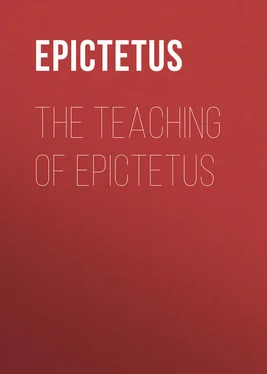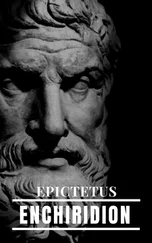Epictetus - The Teaching of Epictetus
Здесь есть возможность читать онлайн «Epictetus - The Teaching of Epictetus» — ознакомительный отрывок электронной книги совершенно бесплатно, а после прочтения отрывка купить полную версию. В некоторых случаях можно слушать аудио, скачать через торрент в формате fb2 и присутствует краткое содержание. Жанр: Философия, foreign_antique, foreign_prose, на английском языке. Описание произведения, (предисловие) а так же отзывы посетителей доступны на портале библиотеки ЛибКат.
- Название:The Teaching of Epictetus
- Автор:
- Жанр:
- Год:неизвестен
- ISBN:нет данных
- Рейтинг книги:5 / 5. Голосов: 1
-
Избранное:Добавить в избранное
- Отзывы:
-
Ваша оценка:
- 100
- 1
- 2
- 3
- 4
- 5
The Teaching of Epictetus: краткое содержание, описание и аннотация
Предлагаем к чтению аннотацию, описание, краткое содержание или предисловие (зависит от того, что написал сам автор книги «The Teaching of Epictetus»). Если вы не нашли необходимую информацию о книге — напишите в комментариях, мы постараемся отыскать её.
The Teaching of Epictetus — читать онлайн ознакомительный отрывок
Ниже представлен текст книги, разбитый по страницам. Система сохранения места последней прочитанной страницы, позволяет с удобством читать онлайн бесплатно книгу «The Teaching of Epictetus», без необходимости каждый раз заново искать на чём Вы остановились. Поставьте закладку, и сможете в любой момент перейти на страницу, на которой закончили чтение.
Интервал:
Закладка:
This was the general physical system on which all Stoics were agreed, although there were differences of opinion upon minor points; such as how far these successive cycles resembled each other? some asserting that they did so in the minutest detail, others only in their larger features. It was a system, for all its superstitions, not without grandeur and truth. At bottom it expressed a sense of that phenomenon of ebb and flow, systole and diastole, the action and counteraction of balanced forces, which is perhaps the profoundest law of life.
Two questions arise in connection with the Stoic cosmogony, which we must briefly discuss before proceeding farther. Are we justified in terming their view of the universe a materialistic one? and what was their doctrine of the destinies of the human soul? Now it is certainly the usual practice among writers on philosophy to reckon the Stoics as materialists, and it is unquestionably true that they denied the possibility of any existence which was not corporeal. Strong as they are on the supremacy of the human soul over the human body, sharp as is the line with which they divide these elements, yet the distinction is a moral, not a metaphysical one – each is an actual material substance. But we shall be seriously mistaken, nevertheless, if we place them in the same class with the scientific materialists of the present day. According to the latter, Thought is no necessary moment in the universe, but merely a product of certain accidental combinations of matter, a product which, when these are dissolved, must disappear from existence, without leaving a trace of its presence behind. Again, according to most modern opponents of the materialistic view, Thought has an independent and immortal being – it existed before matter was, and would continue to exist if all matter were annihilated. The Stoic view differed from each of these modern theories. It held Thought and Matter to be eternal, inseparable, and, indeed, strictly identical. Being in its primitive and purest form was fire, a corporeal substance, but one exhibiting consciousness, purpose, will.
As to the question of the Stoic view of the immortality of the human soul, it does not seem to me to deserve so much discussion as it has received from some commentators. It is obvious that the soul must, in the end, share the lot of all other existences, and be resolved into the Divine Being which was its source. The only question that can arise is whether this resolution takes place at the moment of death, or whether the sense of personal identity persists for a certain period beyond that event; and this question, which Epictetus appears to have been wise enough to leave an open one, is philosophically of very little importance. The soul is immortal, the individual perishes; this is the conclusion of Stoicism, and if we know this, there is little else it can much concern us to know.
The reader who desires to gain a thorough knowledge of Hellenistic philosophy, and of the social and political conditions in which it throve, will find what he seeks in two works to which I have to express my large indebtedness. One is Zeller’s Philosophie der Griechen ( Epikureer , Stoiker u. Skeptiker ), 4 4 An English translation of this work has lately appeared.
a monument of German research and erudition, in which vast masses of original material for the study of this most interesting, but neglected, epoch of the development of European intellect have been brought together, and interpreted with more than German lucidity and method. The other is Professor Mahaffy’s recent volume, Greek Life and Thought , a study of the Hellenistic period in various aspects, which the scholar will not read without profit, nor the lay-reader without pleasure.
We turn now to that department of the Stoic philosophy with which the reader of Epictetus is most concerned – its Ethics.
The ethical question resolves itself into a search for the supreme object of human endeavor, the Summum Bonum , the absolute and essential good. This, for the Stoic, embodied itself in the formula, “to live according to Nature.” But what is Nature? The will of God, as revealed in the heart and conscience of those who seek to know it, and interpreted through the observation in a reverent and faithful spirit of the facts of life.
Going into the subject more precisely we find certain criteria of moral truth established, προλήψεις, as they were called, that is, primitive, original conceptions, or, as I have rendered them in my translation, “natural conceptions,” dogmas by which all moral questions can be tried. If we inquire into the source of these προλήψεις, we shall find ourselves mistaken in our disposition to think that the Stoics regarded them as innate ideas. Innate they are not, for the Stoics held the soul at birth to be a tabula rasa , or blank page, which only experience could fill with character and meaning. But as Seneca says in his inquiry, “Quomodo ad nos prima boni honestique notitia pervenerit,” 5 5 Ep. 120. 4. ff.
although Nature alone could not teach us these things, could not equip us with the knowledge of them before we entered upon life, yet the “seeds” of this knowledge she does give us; the soul of every man has implanted in it a certain aptness or, indeed, necessity to deduce certain universal truths from such observation and experience as are common to all mankind; and these truths, the προλήψεις, though not strictly innate, have thus an inevitableness and dogmatic force not possessed by those which one man may reach and another miss in the exercise of the ordinary faculties, by argument, study, and so forth. By these natural conceptions the existence and character of God, and the general decrees of the moral law, are considered to be affirmed. If we inquire further how the Stoic explained the fact that some of these so-called inevitable and universal conclusions are denied in all sincerity by men like Epicurus, who were neither bad nor mad, we strike upon the difficulty which confronts all systems that aim at setting up any absolute body of truth, expressible in human language, in place of that partial, progressive, and infinitely varied revelation of God’s mind and purpose to which the uncolored facts of the world’s religious history seem to testify.
The natural conceptions, as I have said, contain the primary doctrines of ethics. None of these are more important for the Stoic than that which declares essential Good to lie in the active, not the passive side of man; in the will, not in the flesh, nor in anything else which the will is unable to control. But a certain relative and conditional goodness may lie in matters which are yet of no moment to the spiritual man, to that part of him which seeks the essential good. And we must note that when Epictetus speaks of certain things as good or bad or indifferent, he is generally speaking of them in their relation to the spiritual man, and in the most absolute and unconditional sense. No evil can happen to the essential part of man, to that side of him which is related to the eternal and divine, without his own will. Hence the death of a beloved friend, or child, or wife, is no evil; and if it be no evil, we are forbidden to grieve for it, or, in the most usual phrase with Epictetus, we are not to be troubled or confounded by it, ταράσσεσθαι. But if this utterance should shock our natural feelings, it will do something which assuredly Epictetus never meant it to do. It is the soul of man which these events cannot injure, and it is the soul which is forbidden to think itself injured by them. Such love of the individual as may be embraced in the larger love of the All, of God – such grief for bereavements and calamities as does not overwhelm the inner man (ii. 19) in a “wave of mortal tumult,” and dull his vital sense of the great moral ends which he was born to pursue, is repeatedly and explicitly admitted by Epictetus. Thus, in iii. 2, we have him arguing against Epicurus that there are certain natural sympathies between man and his kind, and even convicting Epicurus himself of a secret belief in these sympathies. Epicurus had dissuaded his followers from marriage, and the bringing-up of children, on account of the grief and anxiety which such relations necessarily entail. Not so the Stoics – they pressed their disciples to enter into the ordinary earthly relationships of husband, or wife, or citizen, and this without pretending to have found any means of averting the natural consequences which Epicurus dreaded, although they did profess to have discovered something in man which made him equal to the endurance of them. Again, although the condition of ἀπάθεια, of inward peace, of freedom from passions, is again and again represented by Epictetus as the mark of the perfect sage, we are told that this ἀπάθεια is something quite different from “apathy” – a man is not to be emotionless “like a statue.” And a third passage confirming this view is to be found in Book I., ch. xi. (Schweighäuser), where the conduct of a man who was so afflicted by the illness of his little daughter that he ran away from the house, and would hear news of her only through messages, is condemned, not for the affection and anxiety it proved, but for its utter unreasonableness. “Would you,” asks Epictetus, “have her mother and her nurse and her pedagogue, who all love her too, also run away from her, and leave her to die in the hands of persons who neither love nor care for her at all?” There is a grief which is really a self-indulgence, a barren, absorbing, paralyzing grief, which, to the soul possessed by it, makes every other thing in heaven and earth seem strange and cold and trivial. From such grief alone Epictetus would deliver us, and I think he would have accepted Mr. Aubrey de Vere’s noble sonnet on Sorrow as a thoroughly fit poetic statement of Stoic doctrine on this subject: —
Читать дальшеИнтервал:
Закладка:
Похожие книги на «The Teaching of Epictetus»
Представляем Вашему вниманию похожие книги на «The Teaching of Epictetus» списком для выбора. Мы отобрали схожую по названию и смыслу литературу в надежде предоставить читателям больше вариантов отыскать новые, интересные, ещё непрочитанные произведения.
Обсуждение, отзывы о книге «The Teaching of Epictetus» и просто собственные мнения читателей. Оставьте ваши комментарии, напишите, что Вы думаете о произведении, его смысле или главных героях. Укажите что конкретно понравилось, а что нет, и почему Вы так считаете.












